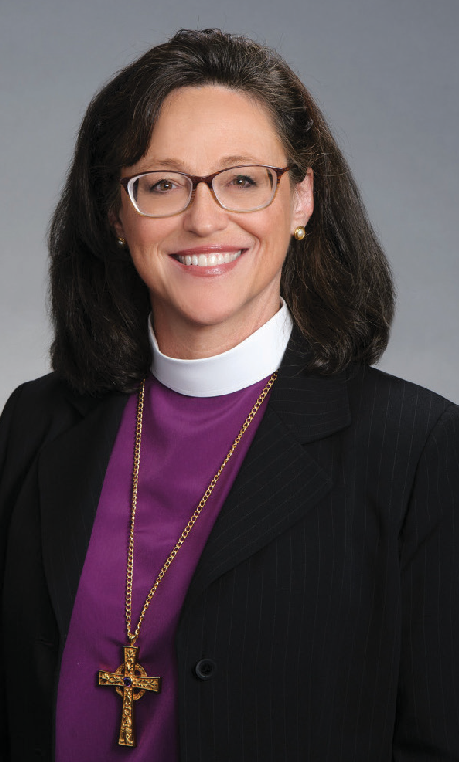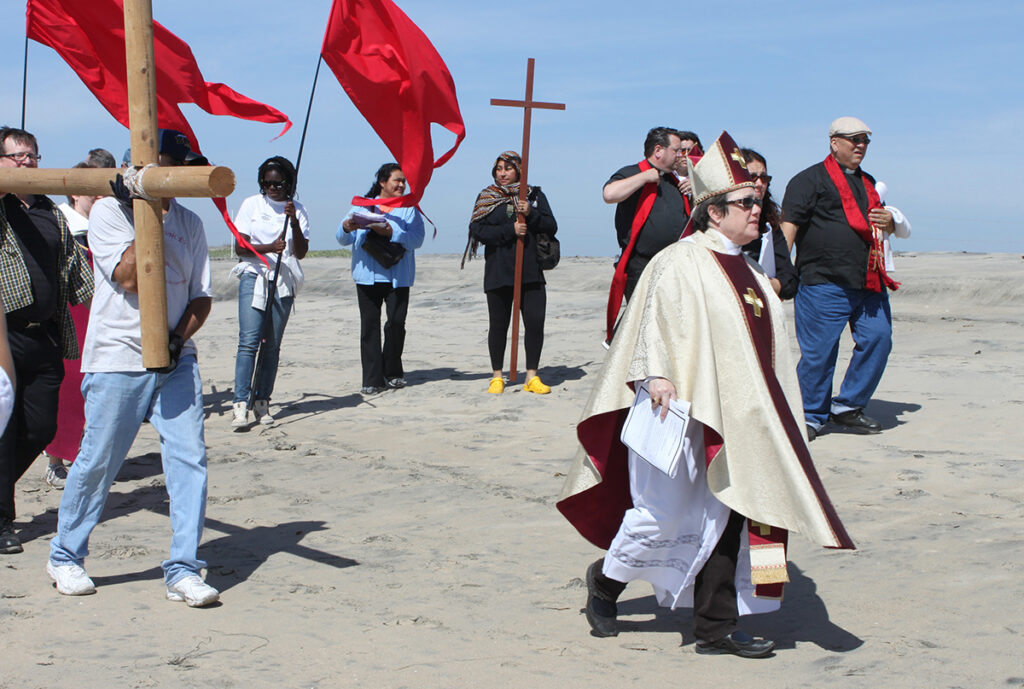Listening Sessions: Leadership, Formation, and the Future
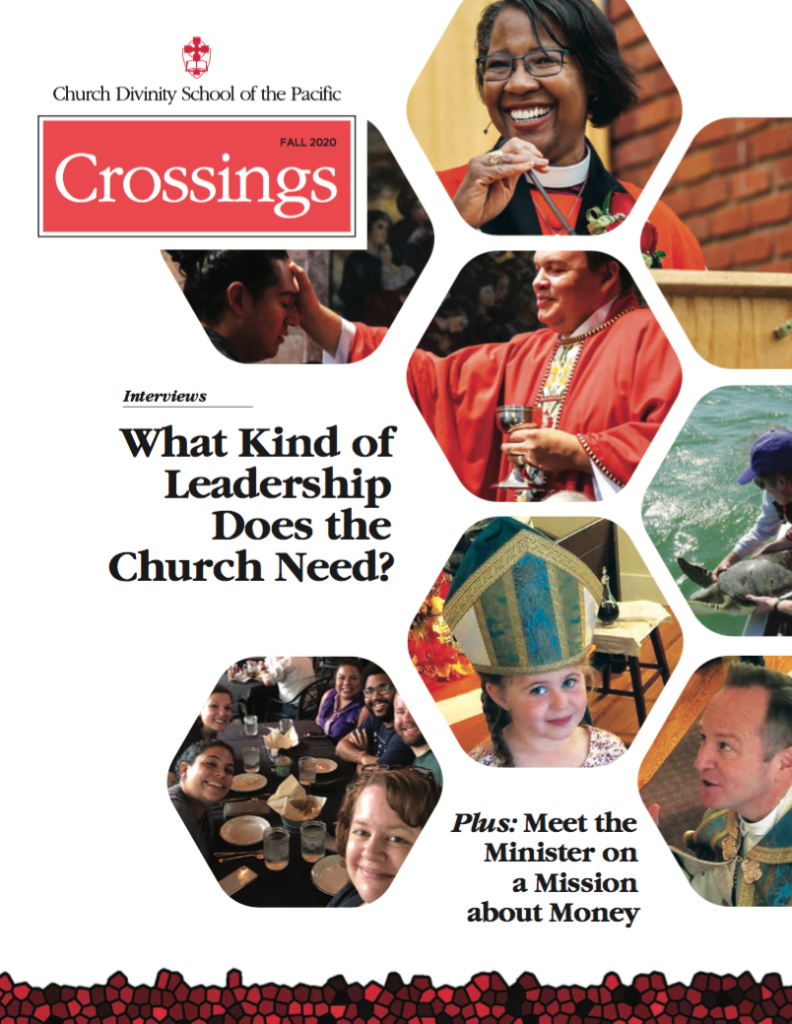
Amid CDSP’s ongoing discernment about our role in the future of leadership formation in the Episcopal Church and beyond, we decided to feature wisdom from leaders we admire. The participants in this package of interview excerpts all play an important role in developing lay and ordained ministers in a wide range of contexts. They include a dozen bishops from around the U.S. and two CDSP alums serving as denominational staff. We asked all of them the same series of questions, three of which are featured here.
Part research project, part podcast interview series, these conversations were too good to limit to a few highlights. So if you’re intrigued by what you read, check your favorite podcast app or cdsp.edu/podcasts to subscribe to Crossings Conversations. The full interviews will be regularly featured there in the coming months.
The excerpts below, one or two from each participant, have been edited for length and clarity.
On the cover: The Rt. Rev. Jennifer Baskerville- Burrows ’97 (top); the Rev. Isaiah “Shaneequa” Brokenleg ’18 (center); the Rt. Rev. Katharine Jefferts Schori ’94 (right); the Rt. Rev. Thomas Brown ’97 (lower right); the Rev. Shannon Kelly ’99 (lower left).
Q: How has your thinking about leadership formation changed?
The Rt. Rev. Jennifer Baskerville-Burrows ‘97, Bishop of Indianapolis: When I became bishop, I encountered individuals who wanted to discern ministry but had not had the experience of actually exploring what that might be like. I thought, “Well, what is it like to walk with another person in their Christian journey through a Christian formation class? What is it like to preach a five-minute homily at an evening prayer service?” That’s a lot of institutional trying things on, but I think alongside it are import- ant factors like watching someone explore their faith and watching how they might gather a community when they’re doing other things outside of the institutional church.
The Rev. Isaiah “Shaneequa” Brokenleg ‘18, Episcopal Church Staff Officer for Racial Reconciliation: I think now we’re seeing leadership as more facilitation or organizing. I liken it to being a mid- wife.You’re there to help give birth to whatever’s happening, and you’re not there to control it because that’s not your role. Leadership also looks different in different cultures. In college, when they were hiring for the office of residential life, they would always look at “how people were being leaders.” I would say,“You don’t see that the Asian folks are leaders too.They’re just leading by example rather than trying to control the situation all the time.”
The Rt. Rev. Thomas Brown ‘97, Bishop of Maine: I was ordained bishop June of 2019 and was on track to visit every one of our year- round churches in one year. Then, of course, the coronavirus came, and a cry from sisters and brothers and siblings for racial reckoning.As we speak, we’re just weeks away from the next presidential election. There has been tremendous change. When I think about leadership and leadership formation, I can’t help but think about those things.What I’m experiencing is having to really bone up on and emphasize the gifts of compassion, and the gifts of understanding and listening. Understanding the pressures of the current moment, understanding that lay and clergy leaders alike are learning—for some of them, at a pace they’ve never known.
The Rt. Rev. Diane Jardine Bruce, Bishop Suffragan of Los Angeles: The best-formed clergy I’ve seen are ones who are very comfortable in a multicultural setting. It’s not about having somebody being able to say the mass in Spanish. It’s about really understanding culturally where people are and being able to bridge and build within that context. You can have multiple cultures within one congregation, but you’ve got to be able to bridge and be able to translate not necessarily from one language to another, but from one way of understanding to another.
The Rt. Rev. Mariann Edgar Budde, Bishop of Washington: We’ve taken an approach to selecting candidates for leadership that is much more function-oriented. Personal maturity and self-awareness are among the top of our list. Also the ability to think in an entrepreneurial way. What I mean by that is simply seeing opportunities where there are problems.Things like that you can on some level measure. One thing that I learned from the Diocese of Texas is that unless a person is coming into the ordination process under 30, I’m also looking for a track record. I’m looking for experiences that would demonstrate what the person is feeling called to.

The Rt. Rev. Mary Gray-Reeves, Managing Director of the College for Bishops: We’re a Church that loves its order and our General Convention. We often overdo the formality of that process. As a bishop in Silicon Valley, I was always trying to encourage people, “Just go try it. Let’s stay in conversation. Let’s not worry about the mistakes. Let’s worry about what we’re learning.” The critical reality before us is that we are proclaiming Good News in a world that, increasingly, does not speak religious language. The conversation cannot be, “Let me convince you that what I believe is right and that you want to believe it too,” but rather a conversation and dialogue.
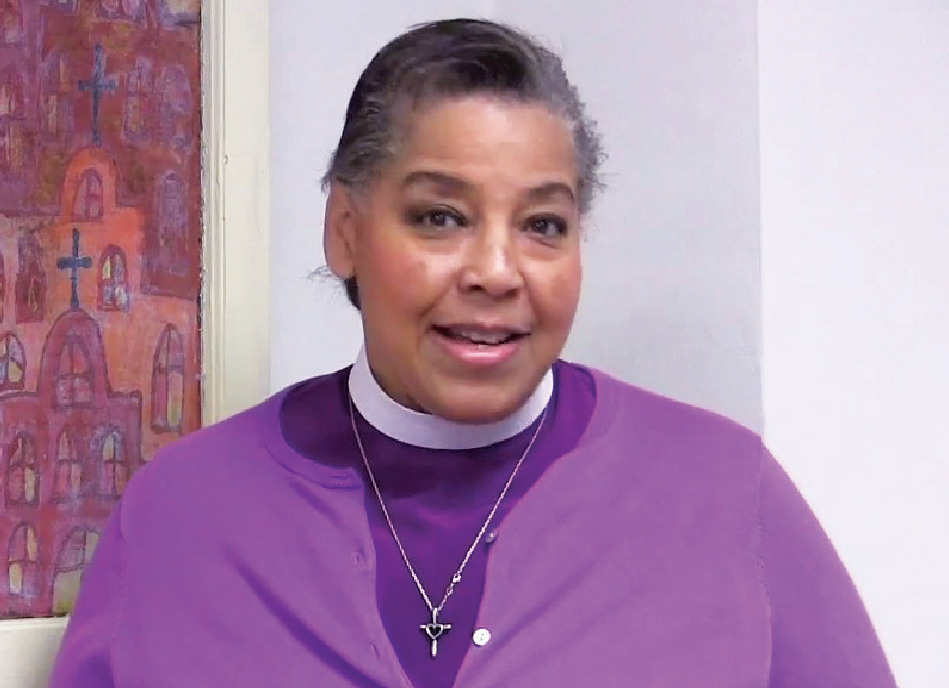
The Rt. Rev. Carlye Hughes, Bishop of Newark: What is most helpful is when people enter with a posture of being willing to learn and willing to try things, and what is not helpful is when people enter into ordained ministry thinking that they have to know all of the answers. The current environment is so topsy turvy and changing so quickly. Every week gets challenging in ways that we weren’t expecting. We really are figuring it out as we go. I can remember someone saying to me in a parish, “What do you mean, figure it out?” I said,“Once we have more information, we’ll start making decisions.” They said, “You can’t run a business like that.” I said, “No, no, no, everybody’s running a business like that.” That was five years ago
The Rt. Rev. Dr. Katharine Jefferts Schori ‘94, 26th Presiding Bishop: I think we see a much greater interest in distance leadership formation linked with residential formation. I think it provides an opportunity for people to continue to be formed within their sending communities, not to be decultures in some sense, so they retain that contextual significance. We’re also seeing lots of creative and innovative ways of participating in other communities during the time of formation for ordained leadership. I think that’s got lots of potential going forward, working in ministry in the community that may be radically different from what the church has done, at least in recent memory. I think that’s just incredibly important. If we don’t continue to evolve, we die.
The Rt. Rev. Deon Johnson, Bishop of Missouri: When we look at our spiritual ancestors, when we look at Jesus, he sent the disciples out in twos. One of the things that we’re beginning to experiment with in the diocese of Missouri is a regional model. The deacon, the priest, and the lay folks work in conjunction, looking at the area, rather than just this specific congregation. We’re in the early stages of planning and figuring out what that looks like, but there’s lots of excitement looking at that new model. It stops the clergy person from feeling like you have to produce, that if your congregation isn’t growing, you’re not doing something important. A team can look at a situation, look at a congregation, look at the ministry area and say, “Where can our resources, time, and energy be focused in ministry?”
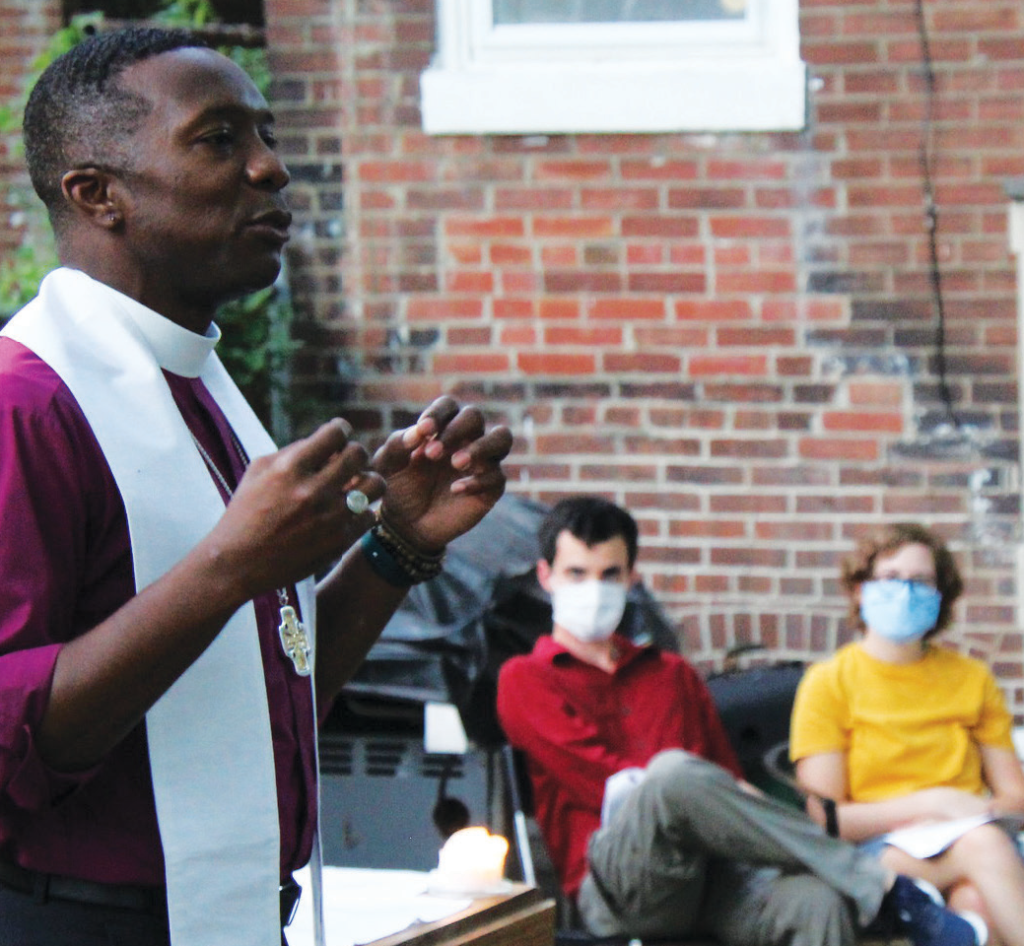
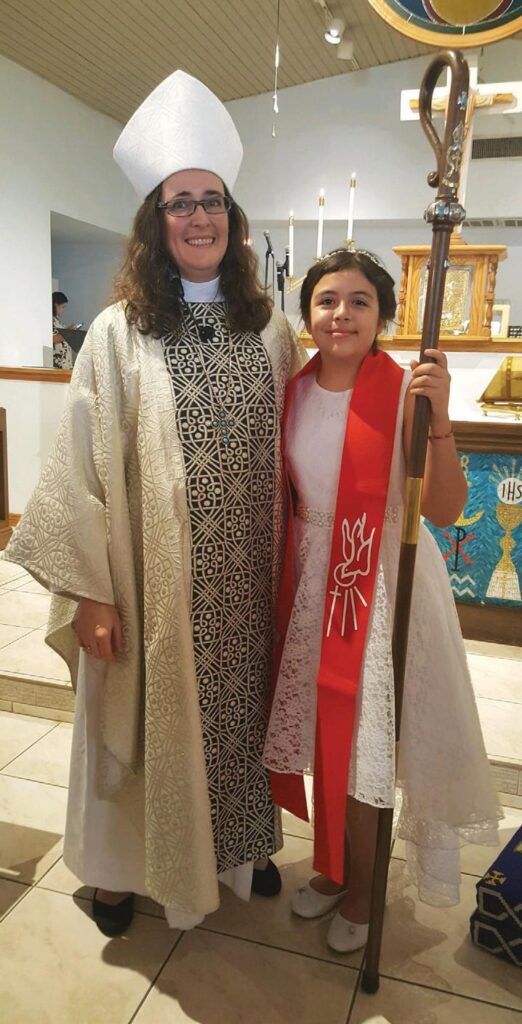
The Rev. Shannon Kelly ‘99, Episcopal Church Director of Faith Formation and Officer for Young Adult and Campus Ministries: In the position I’m working in now, leadership development is about mentorship. So much of formation is what we’ve learned when we’re doing. For instance, if we’re thinking about liturgy and what that might look like for an upcoming event, I don’t just say,“Okay, let’s plan evening prayer.” There’s always some teaching within that.This experience-based leadership formation doesn’t get a lot of credit, but it ends up being where a lot of people’s education started. Experience is a big foundation for discipleship.
The Rt. Rev. Jennifer Reddall, Bishop of Arizona: One thing that has come back to me is thinking about how we form clergy to be self-reflective, like how Jesus goes away to a mountaintop to pray. We need to go away and reflect on our interactions in our ministry and honestly think about things done and left undone. I wonder how else we could teach that in a seminary context? I don’t in any way want to denigrate the knowledge and training that clergy bring, but I also think part of that gift of humility is the ability to take that deep breath and ask, “Okay, what would I have to change for us to move forward?” not just “What does the system need to change or what does the other person need to change?”
The Rt. Rev. Gretchen Rehberg, Bishop of Spokane: We’ve inherited a model where the priest is viewed as the one who does everything, and that model can’t survive. We need to see it as a partnership, and we’re not providing equivalent lay leadership formation. The other thing I would emphasize is the importance of clergy seeing themselves as members of a diocese, not members of the congregation, because our clergy colleagues are in the diocese. The support that we get is not just limited to our own town. I had a priest who’s been here a couple of years now who said that joining the diocese saved his priesthood because of the clergy support system he found here.
The Rt. Rev. Megan Traquair, Bishop of Northern California: The believer side really has to come first: having a personal relationship with a living God. Nothing else is sufficient for this work or for faithful living in the world. There are simply too many impediments, too many disappointments, too many small hurts that come on the way. One resource on the leadership side that I am bringing is a course in nonprofit management, a certificate process from Arizona State University. We are taking the most up-to-date solutions that other nonprofits are finding. It’s best learned once you are in the trenches. It is theoretical until that point.
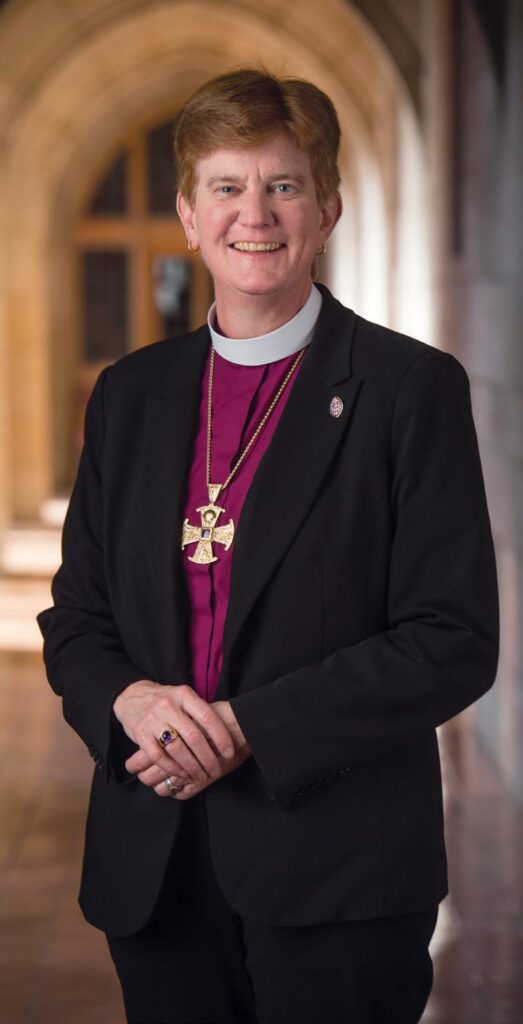
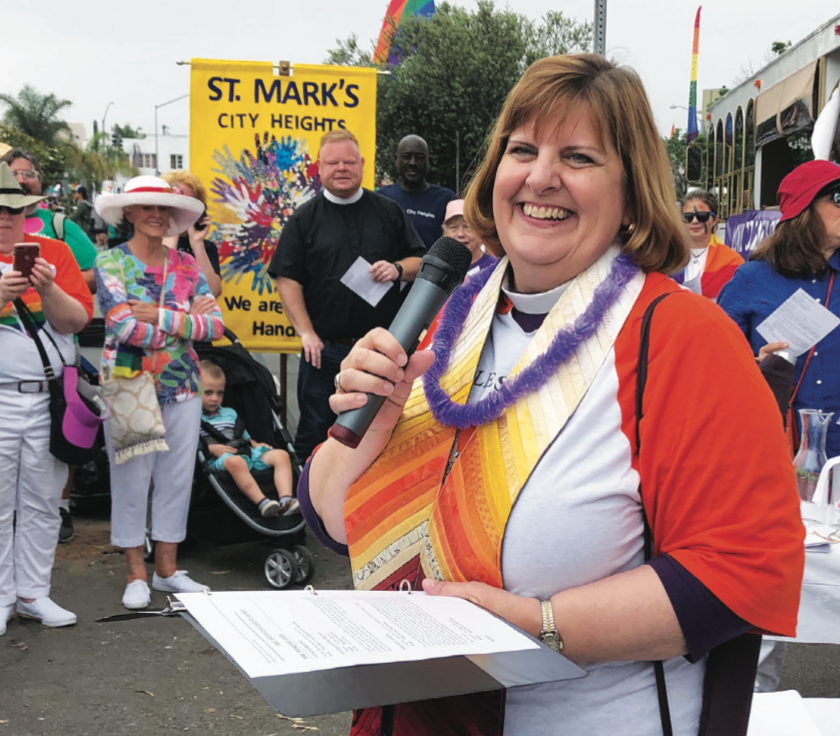
The Rt. Rev. Susan Brown Snook ‘03, Bishop of San Diego: Ordained leadership is not anymore about waiting in your study and crafting a lovely sermon. Sermons are important, but it really is about connecting with the community. There is eternal truth that is applicable everywhere, but the Good News has a different focus or different concentration in different communities. People need to understand what that Good News is for them and for their neighborhoods. They need to learn how to proclaim it. Not all of us are gifted one-on-one evangelists but all of us should be able to lead a community that proclaims the Good News, that gets out into the neighborhood, that responds to the needs that we see there.
Q: What stories have you heard from new leaders that make you hopeful for the future of the church?
Baskerville-Burrows: I had a meeting with a fairly newly ordained priest. He’s been a priest less than three years and a recent graduate from a seminary. He’s finding himself in a job that places him both in a very large and active parish and also starting a new ministry in the community. We talked about how it’s going. He said, “The world has changed with the pandemic. We’re finally able to talk about dismantling white supremacy. There are people on the streets demonstrating.” He said he feels both prepared for this moment and yet nothing could prepare him for it except the foundational pieces that are the real formative work of what does it mean to follow Jesus and to be nimble about that.
He worked full-time while he went to seminary. He had to juggle a lot of things as he raised his family. There’s something about the complexity of moving through seminary formation in that way, which makes him able to step into the current moment. Anyone who’s done it knows it’s really difficult and you don’t have the luxuries that sometimes you might have as a residential seminary student. But he does know how to be nimble, and to think quick, and to build relationships across difference, and to juggle very often competing allegiances in terms of parish and community ministry. I’m finding more stories like that to be ones that give me hope, because the reality is ordaining people to sit in church offices all day, that’s just not what we’re up for.
Brokenleg: A lay leader who’s from the cathedral here in Sioux Falls said, “This summer has been the longest darn Lent that I’ve ever had. I just wish we had some kind of Pride thing.” That’s what she wanted to do. She took the lead and started organizing people and calling people and we put together this Episco-Pride that happened across the country. It included lots of folks of color and held up Black Lives Matter. She just took the lead and it was this amazing thing that happened. All these different folks came into play. I’m seeing some wonderful collaborations that don’t normally take place. I think in the past, clergy tended to be really competitive with each other. I think now folks are so much more able to ask for help, are able to work together. They don’t see it as a sign of weakness. That’s a much more Jesus-centered model.
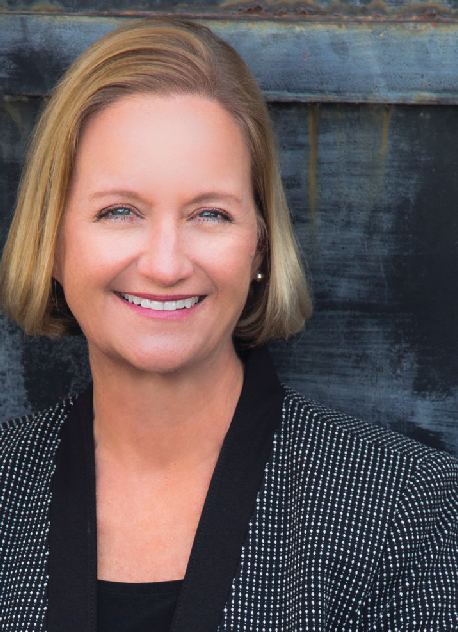
Gray-Reeves: After George Floyd’s horrible death and the protests in our country, I’ve been pleased to see some boldness and bravery from the pulpit. The newly ordained perhaps feel a bit nervous speaking out, but they are. That gives me hope as we name our faith and the radical presence of Jesus as having an appropriate and Godly place in the town square that’s full of protest. It isn’t easy when people want church to be away from all of that, a quiet place where they can go and calm down. It’s a very challenging task for local clergy: How do we develop our spirituality and increase the depth of the peace that passes all understanding while continuing to work for that peace in the wider community? That is the balance between discipleship internally and apostleship in the world that all of us have to sort out as followers of Jesus.
Kelly: There’s a young woman who just graduated from seminary. I’ve known her for years. I remember having a conversation with her at one point. She said, “My worry is, if I discerned to be an ordained minister that I’m going to have to choose between being an English speaker, an Anglo priest, or Spanish speaking—and that those are two very siloed places.” But she has just graduated and is in a setting where she’s using both her English and Spanish. She’s found this great match that just lets her be who she is.
The other little tiny snippet that I’ll share is another young leader who’s on the way to being a lay professional. With the amount of wisdom that person brings into a room, he is always met by clergy saying to him, “When are you going to be ordained? You’re such a good preacher .When are you going to take this seriously?” His ability to stand up and say, “That’s not what I’m called to be,” I think is a phenomenal witness.
That’s my hope of where the church is going.We don’t make leaders fit into the holes we think we have.We invite leaders into ministry, and see where that takes us.
Traquair: One story I’ll tell you is the way one priest introduced himself into a community. Ken Katona came to pastor a small church in central Arizona. As he arrived, he wanted to get to know his neighborhood. I think within his first week, possibly the first day, he drove in and wanted to just walk down the street and get to know his neighborhood. Well, he discovered that they were having a festival and there were all sorts of folks there. He’s walking around in true Ken fashion introducing himself to everybody and sees that they have some karaoke thing going on. Of course, Ken jumps on the stage, when invited, and belts out something. I think it was on the rock ‘n’ roll side of things. It might have involved air guitar. His introduction to that community was, in fact, in exactly the language they were using. It was a fabulous beginning. You have to realize that this is a man who also loves to wear a biretta and is devout in his worship of our Lord Jesus Christ. He speaks both current culture and the deep faith of the church and he can meld them together beautifully.
Subscribe or listen at cdsp.edu/podcasts to hear in the coming months how all our participants answered these questions, plus changes they would make to how the Episcopal Church forms leaders and final words of advice for CDSP.
